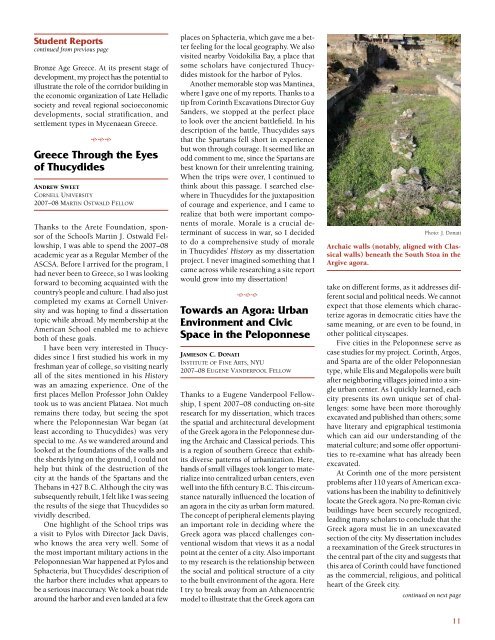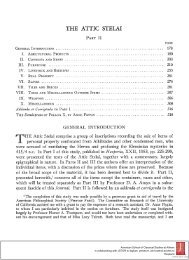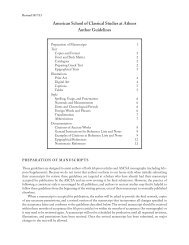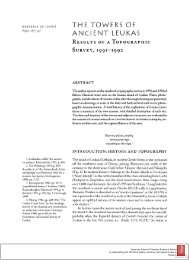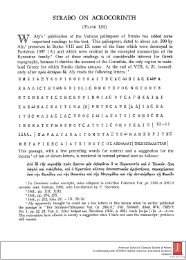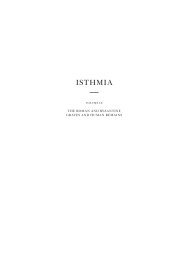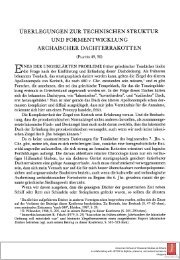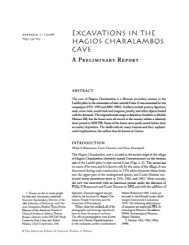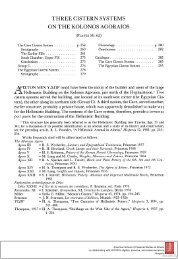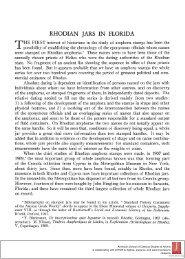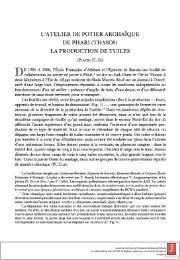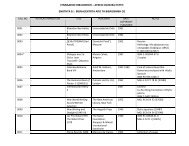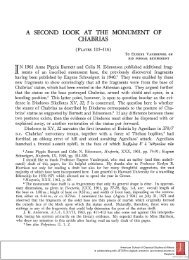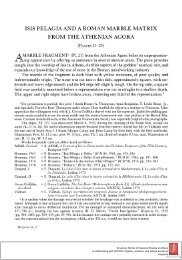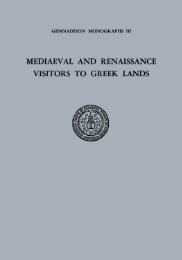2009 edition, nos. 60/61 - The American School of Classical Studies ...
2009 edition, nos. 60/61 - The American School of Classical Studies ...
2009 edition, nos. 60/61 - The American School of Classical Studies ...
You also want an ePaper? Increase the reach of your titles
YUMPU automatically turns print PDFs into web optimized ePapers that Google loves.
student Reports<br />
continued from previous page<br />
Bronze Age Greece. At its present stage <strong>of</strong><br />
development, my project has the potential to<br />
illustrate the role <strong>of</strong> the corridor building in<br />
the economic organization <strong>of</strong> Late Helladic<br />
society and reveal regional socioeconomic<br />
developments, social stratification, and<br />
settlement types in Mycenaean Greece.<br />
ddd<br />
Greece through the eyes<br />
<strong>of</strong> thucydides<br />
Andrew Sweet<br />
cornell University<br />
2007–08 MArtin os t wA l d Fellow<br />
Thanks to the Arete Foundation, sponsor<br />
<strong>of</strong> the <strong>School</strong>’s Martin J. Ostwald Fellowship,<br />
I was able to spend the 2007–08<br />
academic year as a Regular Member <strong>of</strong> the<br />
ASCSA. Before I arrived for the program, I<br />
had never been to Greece, so I was looking<br />
forward to becoming acquainted with the<br />
country’s people and culture. I had also just<br />
completed my exams at Cornell University<br />
and was hoping to find a dissertation<br />
topic while abroad. My membership at the<br />
<strong>American</strong> <strong>School</strong> enabled me to achieve<br />
both <strong>of</strong> these goals.<br />
I have been very interested in Thucydides<br />
since I first studied his work in my<br />
freshman year <strong>of</strong> college, so visiting nearly<br />
all <strong>of</strong> the sites mentioned in his History<br />
was an amazing experience. One <strong>of</strong> the<br />
first places Mellon Pr<strong>of</strong>essor John Oakley<br />
took us to was ancient Plataea. Not much<br />
remains there today, but seeing the spot<br />
where the Peloponnesian War began (at<br />
least according to Thucydides) was very<br />
special to me. As we wandered around and<br />
looked at the foundations <strong>of</strong> the walls and<br />
the sherds lying on the ground, I could not<br />
help but think <strong>of</strong> the destruction <strong>of</strong> the<br />
city at the hands <strong>of</strong> the Spartans and the<br />
<strong>The</strong>bans in 427 B.C. Although the city was<br />
subsequently rebuilt, I felt like I was seeing<br />
the results <strong>of</strong> the siege that Thucydides so<br />
vividly described.<br />
One highlight <strong>of</strong> the <strong>School</strong> trips was<br />
a visit to Pylos with Director Jack Davis,<br />
who knows the area very well. Some <strong>of</strong><br />
the most important military actions in the<br />
Peloponnesian War happened at Pylos and<br />
Sphacteria, but Thucydides’ description <strong>of</strong><br />
the harbor there includes what appears to<br />
be a serious inaccuracy. We took a boat ride<br />
around the harbor and even landed at a few<br />
places on Sphacteria, which gave me a better<br />
feeling for the local geography. We also<br />
visited nearby Voidokilia Bay, a place that<br />
some scholars have conjectured Thucydides<br />
mistook for the harbor <strong>of</strong> Pylos.<br />
Another memorable stop was Mantinea,<br />
where I gave one <strong>of</strong> my reports. Thanks to a<br />
tip from Corinth Excavations Director Guy<br />
Sanders, we stopped at the perfect place<br />
to look over the ancient battlefield. In his<br />
description <strong>of</strong> the battle, Thucydides says<br />
that the Spartans fell short in experience<br />
but won through courage. It seemed like an<br />
odd comment to me, since the Spartans are<br />
best known for their unrelenting training.<br />
When the trips were over, I continued to<br />
think about this passage. I searched elsewhere<br />
in Thucydides for the juxtaposition<br />
<strong>of</strong> courage and experience, and I came to<br />
realize that both were important components<br />
<strong>of</strong> morale. Morale is a crucial determinant<br />
<strong>of</strong> success in war, so I decided<br />
to do a comprehensive study <strong>of</strong> morale<br />
in Thucydides’ History as my dissertation<br />
project. I never imagined something that I<br />
came across while researching a site report<br />
would grow into my dissertation!<br />
ddd<br />
towards an Agora: urban<br />
environment and Civic<br />
space in the Peloponnese<br />
JAmieSon C. donAti<br />
institUte oF Fine Arts, nyU<br />
2007–08 eUgene vAnderpool Fellow<br />
Thanks to a Eugene Vanderpool Fellowship,<br />
I spent 2007–08 conducting on-site<br />
research for my dissertation, which traces<br />
the spatial and architectural development<br />
<strong>of</strong> the Greek agora in the Peloponnese during<br />
the Archaic and <strong>Classical</strong> periods. This<br />
is a region <strong>of</strong> southern Greece that exhibits<br />
diverse patterns <strong>of</strong> urbanization. Here,<br />
bands <strong>of</strong> small villages took longer to materialize<br />
into centralized urban centers, even<br />
well into the fifth century B.C. This circumstance<br />
naturally influenced the location <strong>of</strong><br />
an agora in the city as urban form matured.<br />
<strong>The</strong> concept <strong>of</strong> peripheral elements playing<br />
an important role in deciding where the<br />
Greek agora was placed challenges conventional<br />
wisdom that views it as a nodal<br />
point at the center <strong>of</strong> a city. Also important<br />
to my research is the relationship between<br />
the social and political structure <strong>of</strong> a city<br />
to the built environment <strong>of</strong> the agora. Here<br />
I try to break away from an Athenocentric<br />
model to illustrate that the Greek agora can<br />
Photo: J. Donati<br />
Archaic walls (notably, aligned with <strong>Classical</strong><br />
walls) beneath the South Stoa in the<br />
Argive agora.<br />
take on different forms, as it addresses different<br />
social and political needs. We cannot<br />
expect that those elements which characterize<br />
agoras in democratic cities have the<br />
same meaning, or are even to be found, in<br />
other political cityscapes.<br />
Five cities in the Peloponnese serve as<br />
case studies for my project. Corinth, Argos,<br />
and Sparta are <strong>of</strong> the older Peloponnesian<br />
type, while Elis and Megalopolis were built<br />
after neighboring villages joined into a single<br />
urban center. As I quickly learned, each<br />
city presents its own unique set <strong>of</strong> challenges:<br />
some have been more thoroughly<br />
excavated and published than others; some<br />
have literary and epigraphical testimonia<br />
which can aid our understanding <strong>of</strong> the<br />
material culture; and some <strong>of</strong>fer opportunities<br />
to re-examine what has already been<br />
excavated.<br />
At Corinth one <strong>of</strong> the more persistent<br />
problems after 110 years <strong>of</strong> <strong>American</strong> excavations<br />
has been the inability to definitively<br />
locate the Greek agora. No pre-Roman civic<br />
buildings have been securely recognized,<br />
leading many scholars to conclude that the<br />
Greek agora must lie in an unexcavated<br />
section <strong>of</strong> the city. My dissertation includes<br />
a reexamination <strong>of</strong> the Greek structures in<br />
the central part <strong>of</strong> the city and suggests that<br />
this area <strong>of</strong> Corinth could have functioned<br />
as the commercial, religious, and political<br />
heart <strong>of</strong> the Greek city.<br />
continued on next page<br />
11


